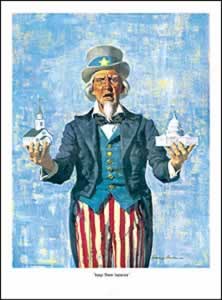In his last official act of business in 2011, President Barack Obama signed the National Defense Authorization Act from his vacation rental in Kailua, Hawaii. In a statement, the president said he did so with reservations about key provisions in the law — including a controversial component that would allow the military to indefinitely detain terror suspects, including American citizens arrested in the United States, without charge.
The legislation has drawn severe criticism from civil liberties groups, many Democrats, along with Republican presidential candidate Ron Paul, who called it “a slip into tyranny.” Recently two retired four-star Marine generals called on the president to veto the bill in a New York Times op-ed, deeming it “misguided and unnecessary.”
“Due process would be a thing of the past,” wrote Gens Charles C. Krulak and Joseph P. Hoar. “Current law empowers the military to detain people caught on the battlefield, but this provision would expand the battlefield to include the United States – and hand Osama bin Laden an unearned victory long after his well-earned demise.”
The president defended his action, writing that he signed the act, “chiefly because it authorizes funding for the defense of the United States and its interests abroad, crucial services for service members and their families, and vital national security programs that must be renewed.”
Senior administration officials, who asked not to be named, told ABC News, “The president strongly believes that to detain American citizens in military custody infinitely without trial, would be a break with our traditions and values as a nation, and wants to make sure that any type of authorization coming from congress, complies with our Constitution, our rules of war and any applicable laws.”
One official explained that President Obama does believe, however, that American citizens can be temporarily detained, and that the military has the right to capture and hold any citizen who is engaged in conflict against the United States. If various provisions in the law prove unworkable, the president could go back to Congress to ask for changes.
“The president is going to adhere to the policies that he has held over the last three years, making sure that none of these congressional provisions impede the ability of the counterterrorism and military professional from keeping the country safe,” the official said.















